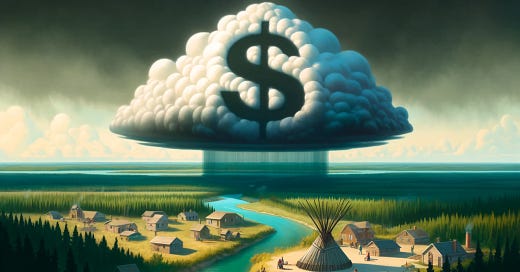The Impending Collapse of Canada's Indigenous Commitment
The Interest Payments Alone on Federal and Provincial Government Debt Are Unsustainable, Where Will the Collapse of the Canadian Economy Leave Indigenous People That DON'T EVEN OWN THEIR LAND?
As Canada's government debt continues to burgeon, concerns deepen over its impact on various sectors, particularly Indigenous communities. The 2024 federal budget has notably allocated the lowest investment in Indigenous communities in a generation, raising significant concerns about the sustainability and enhancement of services and infrastructure critical to these groups.
To understand the financial magnitude, consider that each billion dollars of government spending costs the average Canadian household approximately $66. Reflecting on the past year's expenditures: Canada spent $13 billion on aid to Ukraine, $20 billion on consultants, $7 billion on foreign aid, and an additional $54 billion on interest payments. These figures are staggering when juxtaposed with the needs within our own borders, especially those of Indigenous communities
13+20+7+54=94 Billion dollars 94x66=$6204 tax burden per household. BEFORE ANY CANADIAN SERVICE IS CONSIDERED. This unsustainable fiscal situation WILL come home to roost. Canada is sitting on the third largest debt bubble of the last 100 years. Notably the US economy crashed in 2008 at a smaller bubble than ours and Greece’s financial doom was triggered by a bubble only 2/3 the size of the one we’re sitting on….
The fiscal priorities of the government are under scrutiny as it becomes apparent that Indigenous communities are not receiving adequate attention or resources. This is further complicated by the fact that many Indigenous people do not have ownership of the reserves on which they live, complicating their ability to leverage land for economic or developmental benefits.
As Canada's economic situation becomes more precarious, and the potential for a weakening currency or a broader governmental fiscal crisis looms, serious questions arise about the resilience of Indigenous communities. With limited investments and an increasing debt burden, there's a real risk that these communities could face neglect in the critical areas of healthcare, education, and infrastructure development.
This situation poses a challenge not only to the well-being of Indigenous populations but also to the country's commitment to reconciliation and equitable treatment. As the government juggles debt and spending priorities, the need for a thoughtful, balanced approach that genuinely considers the long-term welfare of all citizens, including Indigenous communities, has never been more crucial.
What do you propose?
Is our current situation sustainable?
When can we break free from the confines of the various ruling governments to experience true self governance?
Please consider subscribing
Darren Grimes








Please share my post and consider the poll at the bottom:
https://open.substack.com/pub/cheriseagirl/p/cuba-set-an-example-what-would-you?r=1b895l&utm_campaign=post&utm_medium=web&showWelcomeOnShare=true
All this debt bubble is a false creation in the fiat current sea in admiralty law... the 'indigenous' which hasn't a clear definition on the UN site clearly has another agenda and that is to prevent a sovereign/sovran movement that the Hereditary Original Peoples are walking.
I'm looking forward to tomorrow's interview on Grimerica Outlaw for a discussion on the UNDRIP/CANDRIP situation and how if the Band Councils and Hereditary Peoples could align their energies with the power of the culture and bloodlines and stand together, this situation could drop in the flash of a second.
Peace be with all in this discussion and may the Creator support this co-creative outcome.
ulnulmch